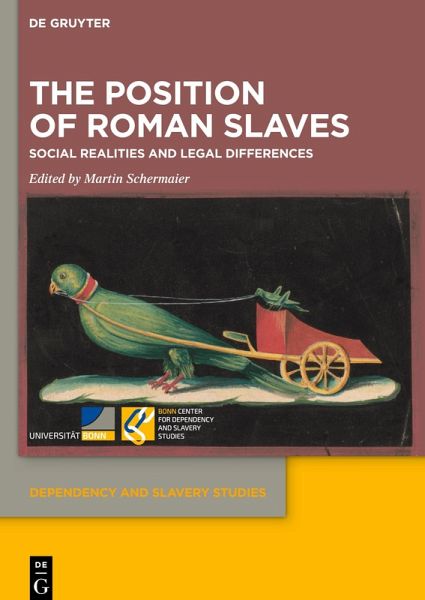
The Position of Roman Slaves
Social Realities and Legal Differences
Herausgegeben: Schermaier, Martin
Versandkostenfrei!
Versandfertig in 1-2 Wochen
84,95 €
inkl. MwSt.

PAYBACK Punkte
0 °P sammeln!
Slaves were property of their dominus, objects rather than persons, without rights: These are some components of our basic knowledge about Roman slavery. But Roman slavery was more diverse than we might assume from the standard wording about servile legal status. Numerous inscriptions as well as literary and legal sources reveal clear differences in the social structure of Roman slavery. There were numerous groups and professions who shared the status of being unfree while inhabiting very different worlds.The papers in this volume pose the question of whether and how legal texts reflected such...
Slaves were property of their dominus, objects rather than persons, without rights: These are some components of our basic knowledge about Roman slavery. But Roman slavery was more diverse than we might assume from the standard wording about servile legal status. Numerous inscriptions as well as literary and legal sources reveal clear differences in the social structure of Roman slavery. There were numerous groups and professions who shared the status of being unfree while inhabiting very different worlds.
The papers in this volume pose the question of whether and how legal texts reflected such social differences within the Roman servile community. Did the legal system reinscribe social differences, and if so, in what shape? Were exceptions created only in individual cases, or did the legal system generate privileges for particular groups of slaves? Did it reinforce and even promote social differentiation? All papers probe neuralgic points that are apt to challenge the homogeneous image of Roman slave law. They show that this law was a good deal more colourful than historical research has so far assumed. The authors' primary concern is to make this legal diversity accessible to historical scholarship.
The papers in this volume pose the question of whether and how legal texts reflected such social differences within the Roman servile community. Did the legal system reinscribe social differences, and if so, in what shape? Were exceptions created only in individual cases, or did the legal system generate privileges for particular groups of slaves? Did it reinforce and even promote social differentiation? All papers probe neuralgic points that are apt to challenge the homogeneous image of Roman slave law. They show that this law was a good deal more colourful than historical research has so far assumed. The authors' primary concern is to make this legal diversity accessible to historical scholarship.














